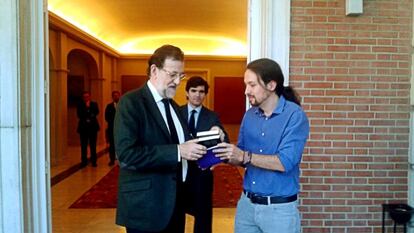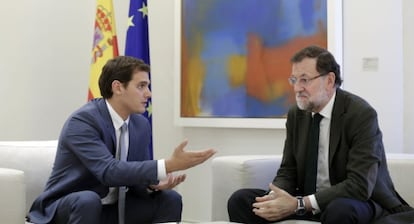PM pledges to study Ciudadanos’ plan to deal with Catalan challenge
Mariano Rajoy meets with party leader Albert Rivera, as well as Podemos chief Pablo Iglesias The prime minister is due to hold talks with other opposition politicians to deal with the crisis

The leader of emerging center-right party Ciudadanos, Albert Rivera, met with Prime Minister Mariano Rajoy today to discuss the challenge the government is facing from Catalonia, which is taking steps toward unilateral secession from Spain.
After the meeting, Rivera told reporters that there was a “general agreement” between the rival politicians over the way forward regarding the northeastern region, and stated that the Popular Party leader had agreed to study Ciudadanos’ proposals.
Rajoy has already met with Socialist Party chief Pedro Sánchez to discuss possible solutions to the conflict
Rivera was called in to La Moncloa prime ministerial palace in response to a declaration this week by pro-secessionist parties in Catalonia of the beginning of an independence process. Junts pel Sí, the nationalist coalition that won the regional election last month, and CUP, a small far-left party whose support is necessary to drive the secessionist bid forward, will take the text to the regional parliament for approval next week.
The prime minister has already met with Socialist Party chief Pedro Sánchez to discuss possible solutions to the current territorial conflict, and has also announced talks with other opposition politicians. One of these is Pablo Iglesias, the leader of left-wing anti-austerity group Podemos. The pony-tailed politician arrived at La Moncloa on Friday afternoon, where he presented Rajoy with a gift: Juan de Mairena, written by Antonio Machado, a collection of the Spanish writer’s prose published in 1936.

Rivera’s plan for the region involves the defense of Spain’s sovereignty, which, his party argues, lies with the Spanish people. This approach is not shared by Podemos or the United Left (IU), who want a binding referendum to be held in the region on independence from Spain. The plan also involves commitment from Spanish political parties to not reach agreements or pacts with forces whose objective is to “break up Spain.”
Through its talks, the government is hoping to reach a basic consensus between parties on a series of principles, before taking any kind of coordinated action or making a statement in Congress.
Both Rivera and Rajoy reportedly coincided on the fact that the response to the Catalan challenge should be a “matter of state.”
Rivera offered Rajoy the support of the 25 deputies that Ciudadanos currently has in the Catalan parliament for any coordinated action that the government should come up with. Rajoy, Rivera reported after the meeting, explained that state attorneys had advised against filing an appeal against the independence declaration with the Constitutional Court, as Rivera had suggested.
Both Rivera and Rajoy coincided on the fact that the response to the Catalan challenge should be a “matter of state”
The timing of the Catalan challenge is crucial, given that the prime minister has called general elections for December 20.
“We need to sign a pact for Spain, so that everyone knows that whoever is in power after December 20, whatever kind of majority emerges from the polls, that this country is not up for grabs, it will not break up and there will be no negotiations about that,” Rivera stated on Friday.
According to the opinion polls, Ciudadanos and Podemos could play key roles in the wake of the December general elections, given that neither the Popular Party nor the Socialists are expected to win a majority. If coalitions with emerging parties are reached, it would mark the end of the two-party system that has been in place in Spain since the country’s return to democracy in the late 1970s.
English version by Simon Hunter.
Who are Ciudadanos?
Founded in 2005 as a Catalan non-nationalist party, Ciudadanos (Citizens) made the jump to national politics last year and secured a presence in most regions at the May elections. In Madrid and Andalusia, Ciudadanos' support was instrumental in getting premiers invested.
With a mix of progressive liberalism and social democracy, and a message of democratic regeneration, Ciudadanos has allied itself with both the Popular Party and the main opposition Socialist Party (PSOE) at the regional level after forcing would-be premiers to sign a list of anti-corruption measures.
At the recent Catalan elections, Ciudadanos took 25 seats in the regional assembly, up from nine, becoming the second-largest presence in Catalan politics, after the pro-independence Junts pel Sí bloc headed by current regional premier Artur Mas.
The party is one of several that stand a good chance at breaking the two-party system that has been in place in Spain since the return of democracy in the late 1970s.
Party leader Albert Rivera bills himself as Catalan, Spanish and European.
Tu suscripción se está usando en otro dispositivo
¿Quieres añadir otro usuario a tu suscripción?
Si continúas leyendo en este dispositivo, no se podrá leer en el otro.
FlechaTu suscripción se está usando en otro dispositivo y solo puedes acceder a EL PAÍS desde un dispositivo a la vez.
Si quieres compartir tu cuenta, cambia tu suscripción a la modalidad Premium, así podrás añadir otro usuario. Cada uno accederá con su propia cuenta de email, lo que os permitirá personalizar vuestra experiencia en EL PAÍS.
¿Tienes una suscripción de empresa? Accede aquí para contratar más cuentas.
En el caso de no saber quién está usando tu cuenta, te recomendamos cambiar tu contraseña aquí.
Si decides continuar compartiendo tu cuenta, este mensaje se mostrará en tu dispositivo y en el de la otra persona que está usando tu cuenta de forma indefinida, afectando a tu experiencia de lectura. Puedes consultar aquí los términos y condiciones de la suscripción digital.








































